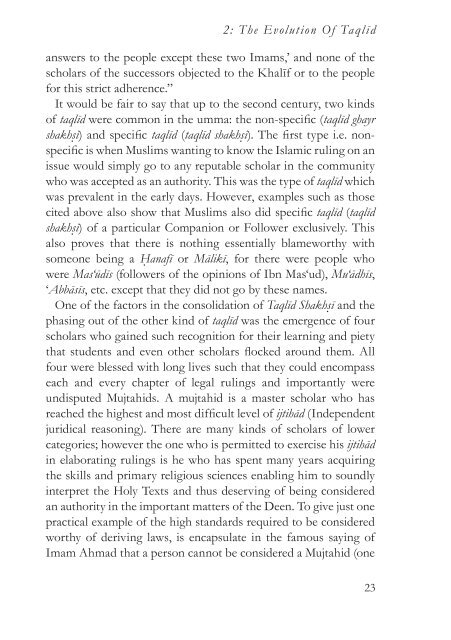Understanding Taqlid by Mufti Muhammad Sajaad
http://www.islamicglobe.com
http://www.islamicglobe.com
Create successful ePaper yourself
Turn your PDF publications into a flip-book with our unique Google optimized e-Paper software.
2: The Evolution Of Taqlīd<br />
answers to the people except these two Imams,’ and none of the<br />
scholars of the successors objected to the Khalīf or to the people<br />
for this strict adherence.”<br />
It would be fair to say that up to the second century, two kinds<br />
of taqlīd were common in the umma: the non-specific (taqlīd ghayr<br />
shakhṣī) and specific taqlīd (taqlīd shakhṣī). The first type i.e. nonspecific<br />
is when Muslims wanting to know the Islamic ruling on an<br />
issue would simply go to any reputable scholar in the community<br />
who was accepted as an authority. This was the type of taqlīd which<br />
was prevalent in the early days. However, examples such as those<br />
cited above also show that Muslims also did specific taqlīd (taqlīd<br />
shakhṣī) of a particular Companion or Follower exclusively. This<br />
also proves that there is nothing essentially blameworthy with<br />
someone being a Ḥanafī or Mālikī, for there were people who<br />
were Mas‘ūdīs (followers of the opinions of Ibn Mas‘ud), Mu‘ādhīs,<br />
‘Abbāsīs, etc. except that they did not go <strong>by</strong> these names.<br />
One of the factors in the consolidation of Taqlīd Shakhṣī and the<br />
phasing out of the other kind of taqlīd was the emergence of four<br />
scholars who gained such recognition for their learning and piety<br />
that students and even other scholars flocked around them. All<br />
four were blessed with long lives such that they could encompass<br />
each and every chapter of legal rulings and importantly were<br />
undisputed Mujtahids. A mujtahid is a master scholar who has<br />
reached the highest and most difficult level of ijtihād (Independent<br />
juridical reasoning). There are many kinds of scholars of lower<br />
categories; however the one who is permitted to exercise his ijtihād<br />
in elaborating rulings is he who has spent many years acquiring<br />
the skills and primary religious sciences enabling him to soundly<br />
interpret the Holy Texts and thus deserving of being considered<br />
an authority in the important matters of the Deen. To give just one<br />
practical example of the high standards required to be considered<br />
worthy of deriving laws, is encapsulate in the famous saying of<br />
Imam Ahmad that a person cannot be considered a Mujtahid (one<br />
23














